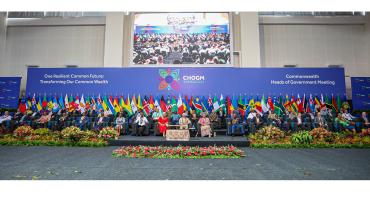ĚÇĐÄĚ˝»¨ hosted a partner’s forum at this week’s World Press Freedom Day conference in Addis Ababa to discuss threats to the electoral process from information and communication technology.

ĚÇĐÄĚ˝»¨ hosted a partner’s forum at this week’s World Press Freedom Day conference in Addis Ababa to discuss threats to the electoral process from information and communication technology (ICT). While ICT has successfully streamlined electoral processes in many countries, it has also opened the door to irresponsible reporting and unregulated hate-speech.
Patsy Robertson, Chair of the Ramphal Institute, reviewed the Commonwealth’s commitment to democracy by observing elections and training journalists. Elena Abrusci, of the University of Essex, spoke of the role big data plays in targeting voters and advocated a human rights-based approach to managing the use of technology in elections. Neil Ford, the Commonwealth’s Director of Communications, briefed participants on a pilot project in Malawi to introduce a media code of conduct for elections, including on-line reporting from citizen journalists. George Monyoncho, Vice Chairman of Kenya’s National Commission on Human Rights, spoke of his country’s effort to protect the right to free speech while at the same time control hate-speech on websites.
Justin Pettit of the Commonwealth’s Human Rights Unit then moderated a lively discussion between the panellists and members of the audience. Several spoke of the need for countries to build the capacity of electoral management bodies so they have more capacity to monitor on-line campaigning and deal with threats posed by hate-speech and fake news. Others proposed reforms for election observer groups, so that their responsibility extends to on-line activity during campaigns. All agreed that healthy democracies must take urgent action if they are to protect elections from on-line threats.
The event took place on the first day of the global World Press Freedom conference in Ethiopia, which is reserved for presentations from partners. The topic of the opening plenary is “Strengthening Media’s Role in the Face of New Challenges” and will include addresses by Sahle-Work Zewde, President of Ethiopia, and Jeremy Hunt, the UK’s Secretary of State for Foreign and Commonwealth Affairs. The UNESCO / Guillermo Cano World Press Freedom Prize will be awarded at the end of the conference.


